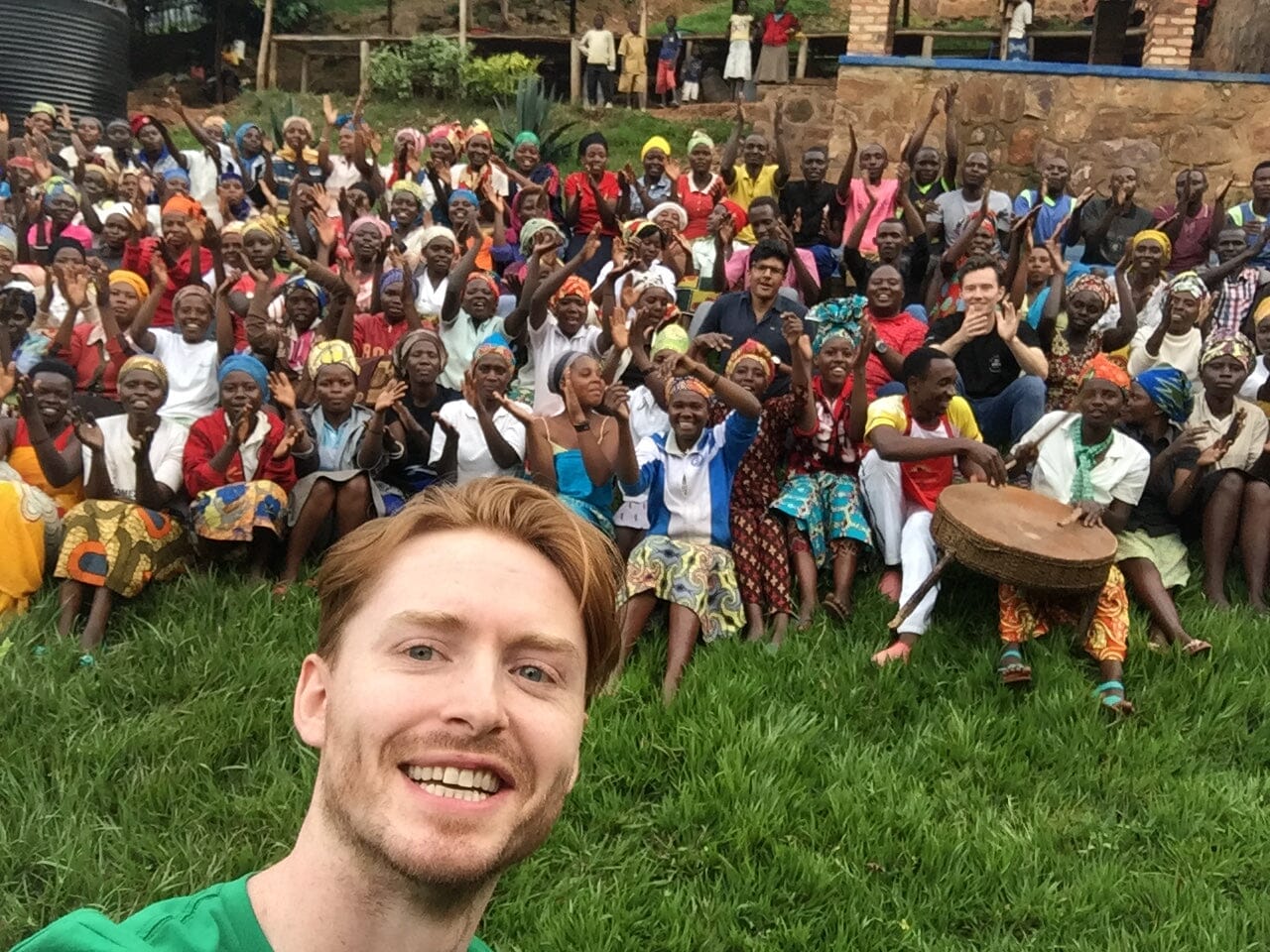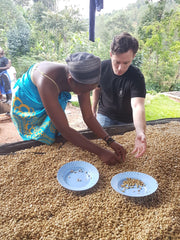

Bumbogo Your Weekend
Bumbogo was the fastest selling of all our Rwandan coffees this last year. The profile of the coffee is really buttery, sweet and overall easy on the palette. There isn't a huge acidity, not a world of complexity, but it's just solid, balanced, sweet coffee. We were able to visit Bumbogo on Friday and see the amazing faces that have a hand in the coffee produced there.
We have a saying at our office that comes from a commenter on Instagram when we first launched Bumbogo on our menu. They commented, "Bumbogo your weekend!" We're not totally sure what it means, but we had a good laugh and it stuck around. So we said that a few times while we toured around Bumbogo with the team :P
The original goal for the day was to tour Shyira, Vunga and Bumbogo as they're near each other, in the Northern area of Rwanda. Due to heavy rains, a flat tire and windshield wiper blades that decided to fall off completely, however, we were considerably slowed down. We'll now tour Shyira and Vunga tomorrow after a morning of cupping.
The team here was really thrilled to see us. They sung and danced and welcomed us in a very traditional Rwandese fashion. We tried to dance with them and even sing a little, but we'll save those videos for the private archives.
Bumbogo just started its second season of production two weeks ago. They purchase cherries from farmers who deliver in their region of Gakenke. The altitude of those farms ranges from 1600m - 2100m. Bumbogo itself sits at 1650m, nestled in an area surrounded by hills. It's a scenic site, just like almost everywhere else in Rwanda.
The geographic location for coffee is really important for quality. The altitude that Bumbogo sits on is rather cool through the day, it gets some shade from the hills and shortened hours of sunlight. These are all important for the coffee when drying. The temperatures range from the high 20's during the day (this time of year) to low-mid 10's at night. So a nice range between the climactic conditions, assisting in the drying of coffee. The average drying time for a washed coffee here is 25 days. Which, as a coffee buyer, I love. This tends to lead to more stability and shelf-life when the green coffee arrives in our warehouse. As an example of this, you can try the Rwandan coffees currently on our menu. They're no longer 'fresh crop', which we classify as 6-8 months after harvest. But, they still show vibrant flavours and receive cupping scores of 85-87 points weekly. Which is about 1, maybe 2 points down from when they first arrived. This is a perfect case of slow drying extending the life of green coffee.
Bumbogo has a really nice practice with their coffee production. As a matter of fact, all the stations we work with, here in Rwanda, have a similar structure to this. Farmers will drop off their daily pickings and will have the weights marked down in a register. This register will summarize all the coffee they deliver throughout the season and will track the expenses owed at the end of the season. Our partners Muraho Trading Co. found, after their first season, that when they paid cash on delivery, farmers would spend their cash on beer or banana wine and rarely on their families. That obviously wasn't sustainable, so they offered the farmers a different deal. Instead of cash up front (Muraho offers the highest price per kilo in the country, by the way), they have provided year round health insurance for the families of the farmers, and now pay for the cherry at the end of the season in a lump sum, during the 'end of year celebration'. At this celebration, they also pay premium bonuses to the farmers who consistently deliver quality cherries. We were told that the farmers weren't thrilled with this deal at first, but now they're huge fans and, overall, more farmers are coming to deliver cherries to these stations! Amazing. How's that for community impact and sustainable practices.



They have four floating tanks that cherries go into right after they've been received. Floating ensures that only the ripe, fully developed cherries that sink to the bottom will make it through to the high grade coffee lots. These sinkers are the ones with proper ripeness and fully developed beans and mucilage inside, thus why they sink! The 'perfect' cherries go into a big receiving tank that gets funnelled into a Pinhal Maquina depulper, manufactured in Brazil. It's honestly not the sexiest looking machine but it does a great job and there isn't a need to change it for now - perhaps with increased volumes that might change. The pulps get removed and the coffee seeds go into a fermentation tank. Then, they do a technique called ikinimba, which is a song and dance conducted on top of the these seeds. The idea is to kick start the fermentation process by activating the sugars and getting them moving. I believe this adds an aromatic and buttery quality to the coffee, totally unique to Rwanda! Have you ever seen wine producers dance and sing while they stomp the grapes? It's kind of like that.

After ikinimba, fermentation occurs overnight. Naturally occurring yeasts in the air begin to eat the sugars and the proteins in the coffee cells and transfer them into acidic compounds. This leads to more complex, clean flavours and vibrancy. After 10-14 hours, they allow this batch of coffee to flow through the serpentine channels to be cleaned and graded, based on density. This is incredibly labor intensive. We had the opportunity to process a lot last year and we were huffing and puffing in no time. These channels are long, slightly angled and winding. So gravity, the flow of water and people-power sort the coffee into different stages of the channel, isolating different sizes and density of beans. The first to flow out is A3, the lightest of them all, then A2, A1- and A1+ last. These all go to their own separate drying beds, where they'll be hand sorted and turned for the next 25 or so days.

You can tell there's a lot of moving parts in the operation of Bumbogo and, really, any coffee washing station. It's important to have team leaders at every stage. The manager of the station, Fidel, has appointed a leader to receiving, processing, handpicking, drying, storage and a machine operator. Similar to any small business, it's critical to empower people and give them responsibility and trust the job they'll conduct. I'm not sure the exact number of employees at Bumbogo, but there must be well over 100. You're welcome to count them in my selfie below. I was given the spotlight by Emmanuel, one of the owners and a visionary of Rwandan coffee, to give a 'speech' for the team at Bumbogo. As nerve wracking as it was, I thanked them for their hard work, their passion and the quality of coffee they produce. I told them it was a best seller on our menu and that Canada has loved the coffee of Bumbogo. They're a really special group filled with smiles, songs and dance. They produce a really special coffee which I, personally, can't wait to get back on the menu!











